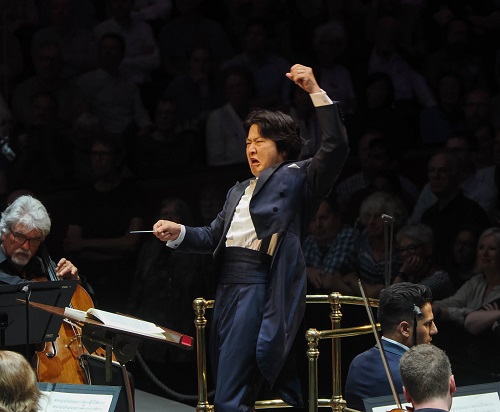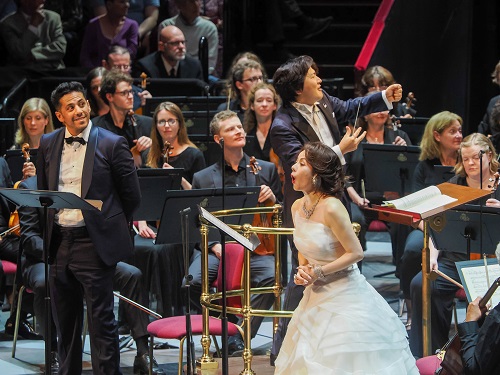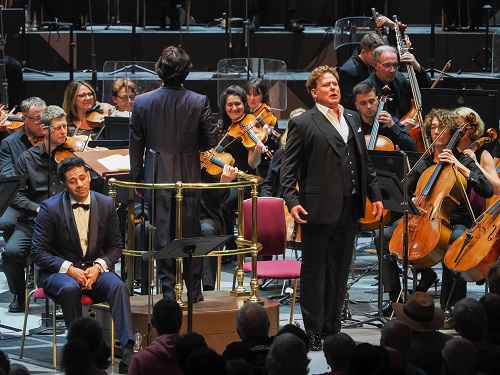Wine, women and song. Immortalized by Johann Strauss II in his 1869 Op.333 waltz, Wein, Weib und Gesang, this was also the title that John Addington Symonds gave to his 1884 English translation of the medieval manuscript, the Codex Buranus – so named by the German philologist Johann Andreas Schmeller in his 1847 edition from which Carl Orff drew the text for his oratorio Carmina Burana. Discovered in 1803 in the Benedictine monastery at Benediktbeuern in Bavaria, the manuscript contains eleventh- and twelfth-century songs collected by wandering scholars: some deal with moral and satirical concerns, others with erotic passions, while alongside drinking and gaming songs there are also religious dramas.
Above all, though, the texts selected by Orff exude love, joy and youthfulness, and Kazuki Yamada’s first Prom as Chief Conductor and Artistic Advisor of the City of Birmingham Symphony Orchestra teemed with all three. It was wonderful to see the Royal Albert Hall packed to the rafters – not a seat to be had, the Arena bursting at the seams and eager listeners peering down from a crowded Gallery. And, a great Carmina means a great chorus: here we had four wonderful Birmingham choirs – the CBSO Chorus, Youth Chorus and CBSO Children’s Chorus, and the University of Birmingham Voices. They stretched across the RAH stage and up into the Choir seats either side of the organ. It was a glorious sight, and sound; amazingly, there was one row of punters, each side, right at the very top of the Choir!
Paradoxically, Yamada was both a small figure standing on the podium before such colossal forces, and a magisterial presence, conducting with bracing energy and flair. Sometimes Yamada seemed to be conducting everyone and everywhere, with eyes in the back of his head, at other times he stood still and, with deft and economical gestures, just let the music happen. Urging his musicians with sweeping, striking baton strokes, and smiles, dancing and bouncing with energy – literally at times – he shaped the immense sonorities with astonishing vigour, precision and economy.

Rhythm was to the fore. I’ve only played Carmina Burana once, some decades ago now, and if I’m honest I don’t remember much about rehearsing and performing the first fiddle part; but, the relish and fire with which CBSO timpanist Matthew Hardy pounded his drums made me wish I was a percussionist! In the ‘Tanz’ preceding ‘Floret Silva’, Yamada’s ability to blend rugged robustness with metrical flexibility, punching out down-beats as he let the intervening bars wriggle, was stunning. ‘In taberna quando sumus’ exemplified the structural tautness, and its contribution to the expressive power of the performance, as the whispers of the men’s chorus were interrupted by explosions by the percussion and brass, the strong pulse challenged by the violins’ almost violin down-bow off-beats. Yamada conducted this movement like a man possessed.
The choral forces were rhythmically and textually crisp. And, that’s such an essential thing in Carmina Burana. Orff wrote his oratorio with a workers’ chorus in mind – the harmonies are fairly straightforward and the repeated sing-along melodies not particularly taxing. But, we need to hear the words. The rhythm and meter of the medieval texts – and it’s worth remembering that the chorus has to sing texts written in twelfth-century Latin, Mittel Hoch Deutsch and a variant of Old French – serve as a driving force for the musical momentum. ‘Ecce Gratum’, celebrating the coming of spring, was superlative in this regard, the bright, clarion instrumental colours matched by the vigour of the choral praise, and percussive jubilation – including some terrifically fired-up violin down-bows – inspiring stunning precision from the massed singers, as the voices became integral to the rhythmic spirit of the work. The antiphonal conversations in ‘Swaz hie gat umbe’ (Those who go round) had terrific brio, too.
For all the grandiosity – though never bombast – of the performance, Yamada did not neglect the details, somehow finding a way for Orff’s wonderfully colourful woodwind writing to shine – in ‘Fortune plango vulnera’, for example, the careful articulation of the men’s voices was complemented by some lovely flute playing, and there were similarly beautiful seductions in ‘Amor volat undique’ for soprano solo and children’s chorus, at the opening of the third section, ‘The Court of Love’. Moreover, there was delicacy to balance the passion: in particular, lovely soprano and alto singing to enjoy in ‘Floret silva’. In fact, if one were to quibble, perhaps the beautifully blended voices were a little too ‘nice’ at times? Could the sound have been ‘harder’ in places? A little more raucous?

The three vocal soloists don’t have a huge amount to do, but their contributions can make or break a Carmina Burana. Baritone Germán Olvera, singing confidently from memory, had terrific vocal weight and stage presence, whether impersonating an inebriated abbot (he relished the rhetoric of ‘Ego sum abbas’), an unbridled lecher (the asymmetries of ‘Estuans interius’ were deliciously louche), or a falsetto’d eunuch (in ‘Dies, nox et omnia’).
When Yamada and the CBSO performed Carmina Burana in Birmingham in April this year, Jennifer France stood in for the indisposed Mari Eriksmoen. On this occasion, soprano Maki Mori stepped into the breach. Mori, dressed in a white gown which evoked the feathers of the swan that is roasted during the oratorio, injected a cool note of sublimity into the sensuous headiness. Though not especially characterful, Mori’s rendition of ‘Stetit puella’ floated ethereally and there was an edifying stillness and calm in ‘In trutina’, when the singer reflects on whether to abandon herself to desire or remain chaste.
The scheduled tenor, Levy Sekgapane, was also indisposed, so it was left to countertenor Matthias Rexroth, to deliver the excruciating cries of the swan as it roasts and rotates on the spit, in ‘Olim lacus colueram’. It probably requires a tenor struggling at the top of his register for the bird’s agonies to be ‘felt’ by the listener, since the vocal line sits more comfortably in the countertenor register, but Rexroth brought raw intensity to the moment.

In the aforementioned April concert, Yamada programmed Panufnik’s twenty-minute Sinfonia Sacra in the first half (and, I see that when Yamada performs Orff’s oratorio in Paris, with the Orchestre National de France, in January 2024 it will be prefaced by Roussel’s Bacchus and Ariane Suite No.2 Op.43). Here, we had Stravinsky’s Symphony of Psalms (1930). The work, commissioned by the Boston Symphony Orchestra to celebrate it’s fiftieth anniversary, has some affinities with Orff’s oratorio: for example, the highly coloured woodwind writing (Stravinsky omits violins, violas and clarinets, and scores for five flutes, four oboes, cor anglais, three bassoons and contrabassoon), and the powerful passages for brass, two pianos, timpani and bass drum.
Yamada coaxed pungent colours from the woodwind in the opening ‘Exaudi orationem meam, domine’, and the chant-like vocal entries were dry and crisp, but the harmonic and motivic tensions of the movement didn’t really drive towards a climax, or onwards to the ‘Expectans expectavi dominum’, though in the latter the rhythmic pulse was effectively established and there were some eloquent solos from oboe and trombone. The longest movement, ‘Alleluia, laudate dominum’ did gain steadily in power – a power expressed, paradoxically, through serenity.
Perhaps, there’s no appropriate ‘prelude’ to Orff’s Machiavellian but marvellous extravagance? If the Codex Buranus is to be believed, those medieval Benedictine monks liked nothing more than a boozy, full-blooded romp. Yamada and his multitudes of singers and musicians made us feel as if we’d been at the party.
Claire Seymour
Igor Stravinsky – Symphony of Psalms;Carl Orff – Carmina burana
Maki Mori (soprano), Levy Sekgapane (tenor), Germán Olvera (baritone), Kazuki Yamada (conductor), CBSO Children’s Chorus, CBSO Chorus, CBSO Youth Chorus, University of Birmingham Voices, City of Birmingham Symphony Orchestra
Royal Albert Hall, London; Thursday 27th July 2023.
All images (c) BBC / Sisi Burn